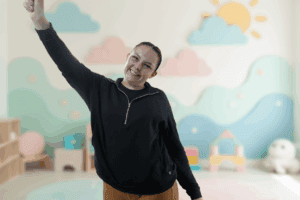A child’s entire sense of belonging and security is carried out by their parents.

I have recently developed a serious passion for psychology, which led me to concepts such as social behavioural learning and conscious parenting. Both concepts have a lot to do with how children learn, and the effect our upbringing has on our parenting styles.
The latter is quite extreme and tends to make a couple of parents uncomfortable – in my opinion. But this is a topic for another day.
The important question here is that are we ever aware, as parents, about how our behaviours affect our children and moulds the kind of people they become?
Arguing for instance. If you are in a relationship, you know how difficult it can become. We sometimes find ourselves disagreeing on a lot of things that can easily turn into arguments. Some of these arguments erupt in the presence of our children. But do we continue and resolve them in front of them?
The SAGE Journals published a study in March 2018 that looked at the relationship between parent conflicts and children’s emotional problems. It specifically looked at associations of a child’s emotion recognition. Emotion recognition looks at the ability for one to identify human emotion from verbal and non-verbal expressions.
The study looked at 99 children between the ages of nine to 11 years and found that children who are exposed to inter-parental conflict struggle to process emotion.
The more severe causes of disruptions in emotion recognition are neglect and maltreatment. But studies show that interparental conflict is less severe, but still has implications on a child’s mental wellbeing.
When we resort to having an altercation with our partner, we are (without saying it), teaching our children how to deal with conflict. In some cases, we go days without talking to our partners because of something that they did days ago. We sometimes go to the extreme lengths of sending our children as messengers. This makes it known to the child that ‘I am not talking to your father because he pissed me off and this is how you sort it out’.
Let’s look at children who are going through a divorce. They usually go through a phase of struggling at school and with personal relationships. This is usually due to watching their parents argue and engage in constant conflict. We are still yet to experience a child that flourished as their parents argued.
A child’s entire sense of belonging and security is carried out by their parents. The disruption of this security is bound to lead to problems. If parents fight, children naturally think that there is something wrong or it is their fault, and this can lead to insecurities.
As an adult, I cannot stand enduring arguments. It is so stressful and I want nothing but to exit that environment. Children can’t simply walk out of their home at 9pm to avoid the stress. So they develop habits of retreating like closing their ears, hiding in cupboards, or locking themselves in their rooms.
Family therapist Marilyn Wedge had a 17-year old patient, Emma, who developed issues such as ADHD. After she spent some time with her, she deduced that she developed psychological problems because of the constant fighting at home which Emma told her about.
The parents kept telling the doctor that Emma was just a shy child who hid in her room the whole day. The parents did not realise that Emma was retreating to her safe place so that she did not have to deal with the fighting.
After the family committed to working on their issues, Emma got better.
Children may develop mental issues such as anxiety and depression due to the stress of living in a household full of arguing.
So what happens in their relationships as they grow up?
They are most likely to treat their partners with hostility. Why? Because it is all they know. Hostility was normalised when they were children.
These are the kids that are more likely to become bullies at school because their outlook on life has been shaped in the household.
These extreme cases are for families that are engaging in arguments regularly.
So is a little arguing in front of the kids okay? Definitely not.
Let’s teach our children how to deal with conflict from a young age. Go to a different room and have a private conversation. You could even make time on a different day to discuss the fallout.
What is more important? Proving that your partner is wrong or ensuring that we instil the right values in our children?
Our children win hands down.
Perfection does not exist. We can’t be perfect parents and can never be the perfect partner. All we can strive towards is being perfect-ish, and that includes making a conscious decision to NEVER argue in front of our children. This is regardless of how small they are.
*Tomorrow I will be writing about what to do when we do happen to argue in front of our children and how to turn it into a lesson of positive relationship building.
If you found this article useful or interesting, why not subscribe to Parenty’s weekly newsletter for a wrap up of that week’s best content.






